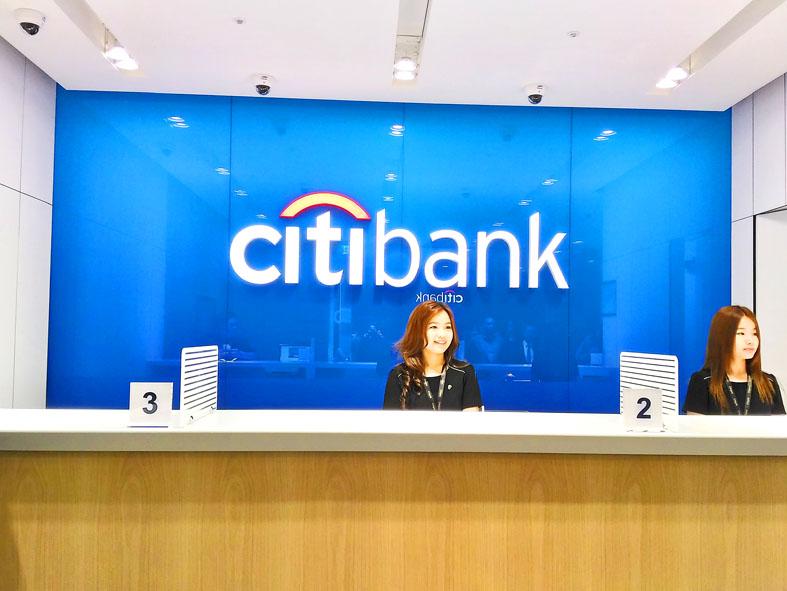Citibank Taiwan Ltd (花旗台灣) yesterday said that credit card clients could continue using their cards as operations would continue normally until it sells its consumer banking business.
As of February, the bank had 2.86 million credit cards in circulation in Taiwan, of which 2.17 million had been used in the past six months, ranking it sixth among all banks, data from the Financial Supervisory Commission showed.
Credit card spending by Citibank clients totaled NT$15.66 billion (US$552.6 million) in February, also ranking sixth among banks in Taiwan. Citibank was the only foreign bank that made it into the top six.

Photo: Lee Chin-hui, Taipei Times
Customers should not be concerned about using their Citi cards, as the bank would be operating normally until it finds a buyer for its consumer banking business, with no timeline set at the moment, the bank said.
Those who have taken personal loans, mortgages or other types of loans from Citibank should continue paying their debt, it said.
The announcement on Thursday by Citigroup Inc, the bank’s parent company, that it would exit the retail banking business in 13 markets — including Taiwan — has raised concern among Taiwanese consumers, with many wondering whether their rights would be protected.
Some Citi credit card holders told the Taipei Times that they were not clear if there is a deadline for redeeming their cash rewards or how long other types of rewards, such as a 40 percent discount on movie tickets, would last.
The Financial Supervisory Commission, which on Thursday confirmed that Citibank Taiwan is seeking a buyer for its consumer banking business, yesterday said it would ask the buyer to ensure that consumers’ rights are protected.
Citibank Taiwan held a videoconference yesterday morning to try to reassure its employees, saying that its decision would not affect them “immediately.”
However, some staff members, speaking on the condition of anonymity, told the Taipei Times that they felt confused and unprepared.
The bank had just in December last year revamped its three credit cards by offering better rewards and improved its digital banking app to attract new customers, they said.
That did not suggest that it would be closing its consumer banking business in less than five months, they said.
Citibank Taiwan actually planned to expand its local investment and recruit more talent at the beginning of this year, people familiar with the matter said.
Meanwhile, DBS Bank Taiwan (星展銀行) yesterday said that it would not comment on market speculation that it would acquire Citibank Taiwan’s consumer banking operation.
Citibank Taiwan reported a pretax profit of US$338 million for last year, ranking first among all foreign banks in the nation, company data showed.
Its return on assets and return on equity stood at 1.14 percent and 9.18 percent respectively last year, higher than the market averages, the data showed.

With an approval rating of just two percent, Peruvian President Dina Boluarte might be the world’s most unpopular leader, according to pollsters. Protests greeted her rise to power 29 months ago, and have marked her entire term — joined by assorted scandals, investigations, controversies and a surge in gang violence. The 63-year-old is the target of a dozen probes, including for her alleged failure to declare gifts of luxury jewels and watches, a scandal inevitably dubbed “Rolexgate.” She is also under the microscope for a two-week undeclared absence for nose surgery — which she insists was medical, not cosmetic — and is

CAUTIOUS RECOVERY: While the manufacturing sector returned to growth amid the US-China trade truce, firms remain wary as uncertainty clouds the outlook, the CIER said The local manufacturing sector returned to expansion last month, as the official purchasing managers’ index (PMI) rose 2.1 points to 51.0, driven by a temporary easing in US-China trade tensions, the Chung-Hua Institution for Economic Research (CIER, 中華經濟研究院) said yesterday. The PMI gauges the health of the manufacturing industry, with readings above 50 indicating expansion and those below 50 signaling contraction. “Firms are not as pessimistic as they were in April, but they remain far from optimistic,” CIER president Lien Hsien-ming (連賢明) said at a news conference. The full impact of US tariff decisions is unlikely to become clear until later this month

GROWING CONCERN: Some senior Trump administration officials opposed the UAE expansion over fears that another TSMC project could jeopardize its US investment Taiwan Semiconductor Manufacturing Co (TSMC, 台積電) is evaluating building an advanced production facility in the United Arab Emirates (UAE) and has discussed the possibility with officials in US President Donald Trump’s administration, people familiar with the matter said, in a potentially major bet on the Middle East that would only come to fruition with Washington’s approval. The company has had multiple meetings in the past few months with US Special Envoy to the Middle East Steve Witkoff and officials from MGX, an influential investment vehicle overseen by the UAE president’s brother, the people said. The conversations are a continuation of talks that

CHIP DUTIES: TSMC said it voiced its concerns to Washington about tariffs, telling the US commerce department that it wants ‘fair treatment’ to protect its competitiveness Taiwan Semiconductor Manufacturing Co (TSMC, 台積電) yesterday reiterated robust business prospects for this year as strong artificial intelligence (AI) chip demand from Nvidia Corp and other customers would absorb the impacts of US tariffs. “The impact of tariffs would be indirect, as the custom tax is the importers’ responsibility, not the exporters,” TSMC chairman and chief executive officer C.C. Wei (魏哲家) said at the chipmaker’s annual shareholders’ meeting in Hsinchu City. TSMC’s business could be affected if people become reluctant to buy electronics due to inflated prices, Wei said. In addition, the chipmaker has voiced its concern to the US Department of Commerce